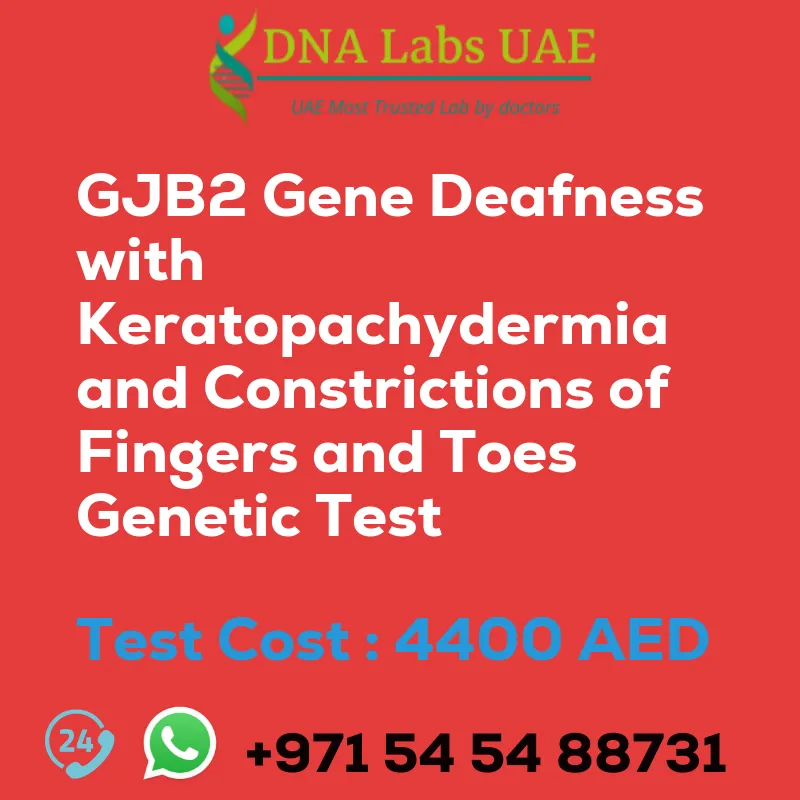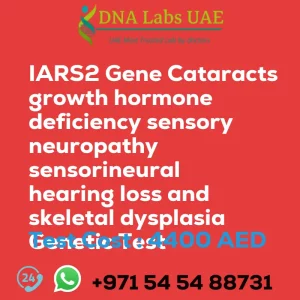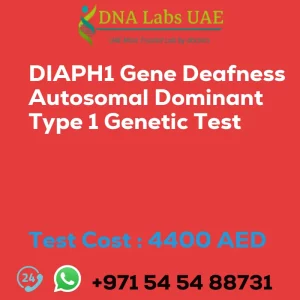GJB2 Gene Deafness with Keratopachydermia and Constrictions of Fingers and Toes Genetic Test
Test Name: GJB2 Gene Deafness with Keratopachydermia and Constrictions of Fingers and Toes Genetic Test
Components: GJB2 Gene Deafness with Keratopachydermia and Constrictions of Fingers and Toes Genetic Test
Price: 4400.0 AED
Sample Condition: Blood or Extracted DNA or One drop Blood on FTA Card
Report Delivery: 3 to 4 Weeks
Method: NGS Technology
Test Type: Ear Nose Throat Disorders
Doctor: ENT Doctor
Test Department: Genetics
Pre Test Information: Clinical History of Patient who is going for GJB2 Gene Deafness with Keratopachydermia and Constrictions of Fingers and Toes NGS Genetic DNA Test. A Genetic Counselling session to draw a pedigree chart of family members affected with GJB2 Gene Deafness with Keratopachydermia and Constrictions of Fingers and Toes NGS Genetic DNA Test gene GJB2
Test Details:
- The GJB2 gene is responsible for encoding a protein called connexin 26, which forms gap junctions in the inner ear.
- Mutations in the GJB2 gene can lead to a form of inherited deafness known as GJB2-related deafness.
- Keratopachydermia is a rare skin disorder characterized by thickening of the skin on the palms of the hands and soles of the feet.
- Constrictions of the fingers and toes refer to a condition called syndactyly, where there is partial or complete fusion of the digits. This can result in the formation of webbed fingers or toes.
- NGS (Next-Generation Sequencing) is a genetic testing method that allows for the simultaneous analysis of multiple genes or even the entire exome (the protein-coding regions of the genome).
- In the context of GJB2-related deafness with keratopachydermia and constrictions of fingers and toes, an NGS genetic test can be used to identify mutations or variants in the GJB2 gene, as well as other genes associated with these specific conditions.
- The NGS genetic test involves obtaining a DNA sample from the individual, usually through a blood or saliva sample.
- The DNA is then sequenced using high-throughput sequencing technology, which generates massive amounts of DNA sequence data.
- Bioinformatics analysis is then performed to identify any genetic variations or mutations that may be contributing to the individual’s symptoms.
Genetic testing can help confirm a diagnosis, provide information about the inheritance pattern, and guide treatment and management options. It can also be useful for genetic counseling and family planning purposes. It is important to consult with a healthcare professional or a genetic counselor to discuss the appropriateness and implications of genetic testing in specific cases.
| Test Name | GJB2 Gene Deafness with keratopachydermia and constrictions of fingers and toes Genetic Test |
|---|---|
| Components | |
| Price | 4400.0 AED |
| Sample Condition | Blood or Extracted DNA or One drop Blood on FTA Card |
| Report Delivery | 3 to 4 Weeks |
| Method | NGS Technology |
| Test type | Ear Nose Throat Disorders |
| Doctor | ENT Doctor |
| Test Department: | Genetics |
| Pre Test Information | Clinical History of Patient who is going for GJB2 Gene Deafness with keratopachydermia and constrictions of fingers and toes NGS Genetic DNA Test. A Genetic Counselling session to draw a pedigree chart of family members affected with GJB2 Gene Deafness with keratopachydermia and constrictions of fingers and toes NGS Genetic DNA Test gene GJB2 |
| Test Details |
The GJB2 gene is responsible for encoding a protein called connexin 26, which forms gap junctions in the inner ear. Mutations in the GJB2 gene can lead to a form of inherited deafness known as GJB2-related deafness. Keratopachydermia is a rare skin disorder characterized by thickening of the skin on the palms of the hands and soles of the feet. It can be associated with other conditions or occur on its own. Constrictions of the fingers and toes refer to a condition called syndactyly, where there is partial or complete fusion of the digits. This can result in the formation of webbed fingers or toes. NGS (Next-Generation Sequencing) is a genetic testing method that allows for the simultaneous analysis of multiple genes or even the entire exome (the protein-coding regions of the genome). In the context of GJB2-related deafness with keratopachydermia and constrictions of fingers and toes, an NGS genetic test can be used to identify mutations or variants in the GJB2 gene, as well as other genes associated with these specific conditions. The NGS genetic test involves obtaining a DNA sample from the individual, usually through a blood or saliva sample. The DNA is then sequenced using high-throughput sequencing technology, which generates massive amounts of DNA sequence data. Bioinformatics analysis is then performed to identify any genetic variations or mutations that may be contributing to the individual’s symptoms. Genetic testing can help confirm a diagnosis, provide information about the inheritance pattern, and guide treatment and management options. It can also be useful for genetic counseling and family planning purposes. It is important to consult with a healthcare professional or a genetic counselor to discuss the appropriateness and implications of genetic testing in specific cases. |








